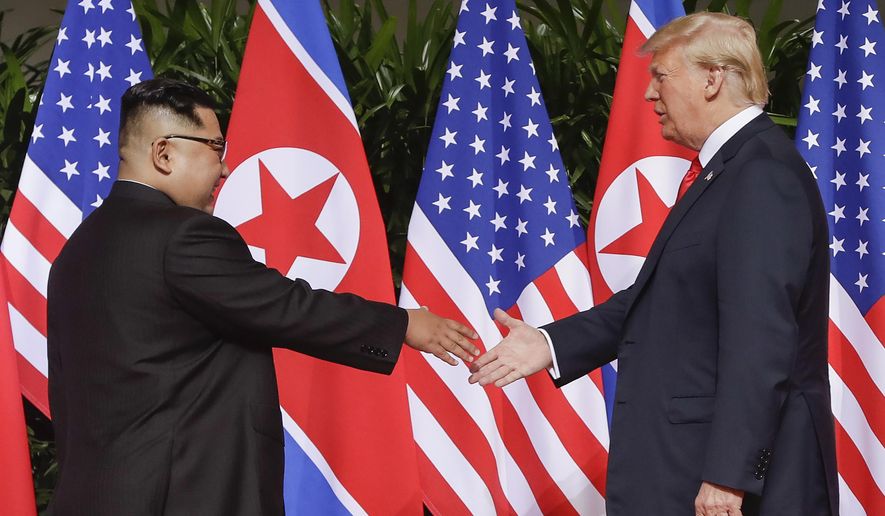OPINION:
The status quo on the Korean peninsula, which had been frozen in place for decades — binding northeast Asia, including Japan and China, in an icy embrace — has begun to show signs of cracking.
President Trump is preparing for his second summit with North Korean leader Kim Jong-un, accepting Mr. Kim’s professions of willingness to negotiate a new relationship, and those preparations have hit new obstacles.
Mr. Kim’s offer to reveal details of his heavy weapons armaments, including nuclear weapons, has turned sour as the United States, South Korea and Japan found an undeclared weapons site serving as the headquarters of one of Pyongyang’s ballistic missile programs.
Behind the breakup of the previous arrangement on the peninsula, developed as a result of the armistice that ended the fighting in the Korean War, were the growing demands on China as a result of international sanctions against Pyongyang. The North Korean regime has managed to find black market sources for trade, but it has depended heavily on Chinese economic aid. This considerable burden on China has come into sharper focus against the slowing Chinese economy.
The demilitarized zone that has served as a buffer between the two Koreas since their three-year war ended in an uneasy truce in July 1953. It continues to keep the two Koreas apart. Before the conflict, the peninsula had been roughly divided along the 38th parallel by the United States and the old Soviet Union at the end of World War II. Six decades after the truce, the two Koreas remain still divided by a 2.5-mile wide, 155-mile-long strip of land centered on the truce village at Panmunjom.
Missile bases would have to be part of any agreement committing North Korea to “complete, verifiable, and irreversible” denuclearization, as promised in the earlier arrangement. The Sino-ri complex in question now is a seven-square-mile base 132 miles north of the demilitarized zone, housing a regiment-sized unit equipped with Nodong-1 medium-range missiles.
The North appears to be playing a familiar bait-and-switch game. The arrangement Pyongyang wants would leave in place this operational capability even if it destroys its nuclear facilities. Washington has been naive, not for the first time, in its negotiations with the Communist state, and now it must put aside its innocence.
The latest revelation suggests the United States has been naive in the assumption that North Korea and its Chinese and Russian sponsors were ready to make a comprehensive deal leading to reunification of the peninsula. The negotiations for a reunited Korean state have been under the auspices and pushed by Sweden. The Swedes often push agreements without the military guarantees that make them acceptable.
Washington’s leverage with Pyongyang, backed by severe sanctions, has been eroded by the aggressive appeasement policies of the left-wing government of President Moon Jae-In in Seoul. President Moon has treated seriously the North’s overtures for reunification. China and North Korea, meanwhile, have worked continuously to split the critical Seoul-Tokyo-Washington strategic alliance.
South Korean conservatives, pointing to the U.S. military pullout from Syria, worry that the Trump administration will withdraw U.S. forces from the South as part of a deal with North Korea and China. North Korea is exploiting the tug-of-war between the United States and South Korea over sharing costs for American forces in Korea. Pyongyang wants to strengthen its argument that the South should unite with the North to fight against “foreign powers.”
Despite 10 rounds of negotiations led by experienced diplomats, the United States and South Korea could not reach an agreement last year on the level of cost sharing. An editorial in the official North Korean newspaper argues that the U.S. demand for an increase in South Korea’s share of defense costs runs counter to easing tensions. Under such conditions, the editorial argues, “it is anachronistic to demand the increase of defense costs contribution by imposing the costs of the deployment of U.S. strategic assets to the Korean peninsula.” And so it goes. Good things do not come easy in Asia.




Please read our comment policy before commenting.